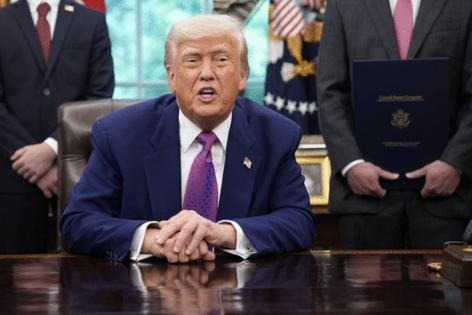Trump signs travel ban for 12 countries
Published in News & Features
WASHINGTON — President Donald Trump on Wednesday signed a proclamation that bans individuals from 12 countries from entering the United States, reinstating one of the most controversial and defining measures from his first term in the wake of an attack in Boulder, Colorado, that targeted a march in support of Israeli hostages.
The second-term travel ban covers Afghanistan, Myanmar, Chad, Republic of the Congo, Equatorial Guinea, Eritrea, Haiti, Iran, Libya, Somalia, Sudan and Yemen. The measure also partially limits entry of people from Burundi, Cuba, Laos, Sierra Leone, Togo, Turkmenistan and Venezuela.
Trump earlier in the week blamed the immigration policies of former President Joe Biden for the presence of the suspect in the Boulder attack, who was an Egyptian who overstayed his visa and wouldn’t have been impacted by the ban. Witnesses say they saw the suspect use a makeshift flamethrower and throw an incendiary device in the attack.
“The recent terror attack in Boulder, Colorado, has underscored the extreme dangers posed to our country by the entry of foreign nationals who are not properly vetted, as well as those who come here as temporary visitors and overstay their visas,” Trump said in a video posted on social media Wednesday. “We don’t want them.”
CBS News first reported Trump’s efforts to block travelers from the 12 countries.
The ban will not apply to those who already have visas, lawful permanent residents of the U.S., or teams traveling for the World Cup or Olympics. Those with special visas to escape persecution in Iran or for assisting the U.S. military effort in Afghanistan are also exempted.
Trump also signed a separate proclamation suspending the visas of foreign students seeking to participate in exchange programs at Harvard University, which has already been a target for the administration that claims it has a liberal bias and isn’t doing enough to address antisemitism.
In the Harvard proclamation, Trump accused the university of failing to discipline conduct violations on campus and complained the university had only turned over information about three foreign students accused of dangerous, illegal or threatening activity.
“Harvard’s actions show that it either is not fully reporting its disciplinary records for foreign students or is not seriously policing its foreign students,” Trump said.
In his first term, Trump barred travelers from Cuba, Iran, Libya, North Korea, Somalia, Sudan, Syria, Venezuela and Yemen.
The addition of Afghanistan in this order comes after the Trump administration suspended the U.S. refugee program and froze federal funding for assistance programs, including those that provided travel for Afghans who had already been approved to resettle in the United States.
The move is the latest step in what has been a sweeping immigration agenda aimed at cracking down on undocumented migration, ramping up deportations of people from the U.S. and completing the construction of the U.S.-Mexico border wall Trump began in his first term. Trump pledged to secure U.S. borders, seizing on voter concerns about crime and a surge in migrants, in his 2024 presidential campaign.
Trump put in motion efforts to reinstate a travel ban quickly upon taking office, ordering the secretaries of State and Homeland Security, the attorney general and director of National Intelligence to identify countries for which “vetting and screening information is so deficient as to warrant a partial or full suspension on the admission of nationals from those countries.”
The travel ban is likely to face legal challenges, just as its first-term predecessor did and with many of Trump’s other immigration actions during his current White House stint already being litigated in the courts. Trump has vowed to carry out an agenda that offers to test the powers of his office on immigration policy.
The first-term travel ban marked a signature moment in Trump’s tenure. Trump in 2017, within days of taking office, issued an order that barred people from seven countries with largely Muslim populations from entering the U.S. for 90 days. The move sparked chaos and confusion at airports, protests across the globe and a flood of lawsuits seeking to halt the order, which critics assailed as a “Muslim ban.”
Trump defended the move as necessary for national security and, after judges struck down the initial version, moved to issue revised orders that altered the list of countries targeted and offered more specifics about the scope of the restrictions in a bid to survive further legal scrutiny.
The subsequent changes to the policy eventually led to the U.S. Supreme Court in 2018 upholding the travel ban, with the justices in a 5-4 ruling rejecting claims that it targeted Muslims and giving Trump a major legal victory that bolstered a president’s broad controls over the nation’s borders. Biden — in one of his first acts in office in 2021 — signed his own order ending Trump’s travel ban.
Trump during the 2024 campaign, though, had vowed to reinstate it and expand the measure to cover refugees from Gaza if elected and his move delivers on a key plank of his agenda.
Since taking office, the president has declared a national emergency at the southern border and directed the Pentagon to deploy additional resources to address the situation.
The administration has also ramped up deportations of undocumented migrants and attempted to end automatic birthright citizenship for children of people in the country illegally — the latter of which has been halted by the courts as they address legal challenges.
The president has also used tariffs to pressure Mexico and Canada to do more to secure the border and directed agencies to identify federally funded programs providing benefits to migrants in the country illegally.
©2025 Bloomberg L.P. Visit bloomberg.com. Distributed by Tribune Content Agency, LLC.







Comments